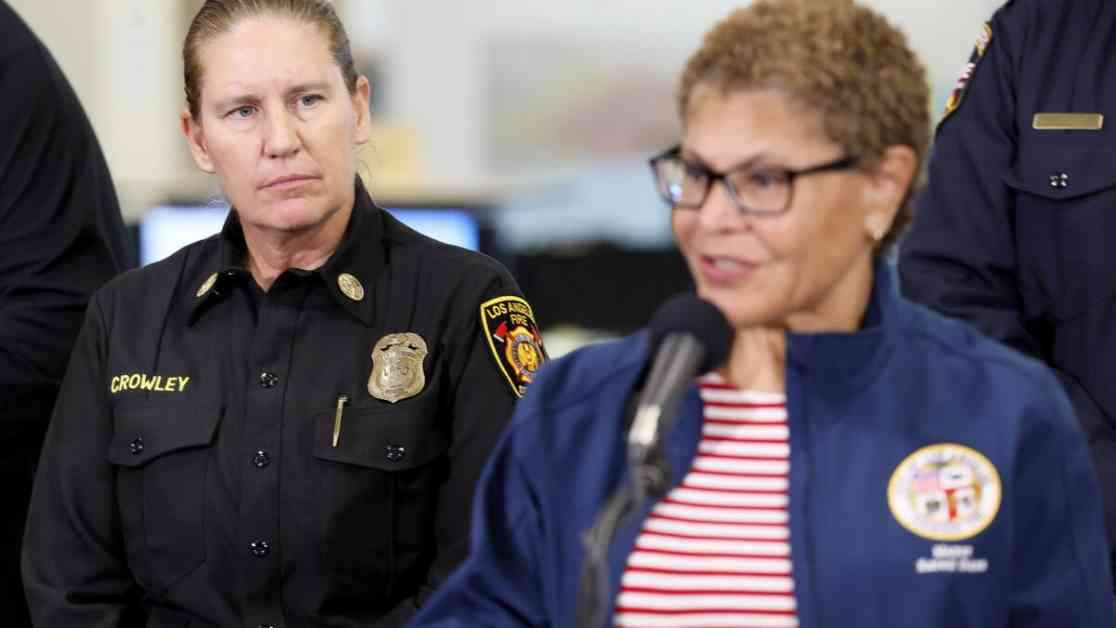Los Angeles Mayor Karen Bass made the bold decision to remove Fire Chief Kristin Crowley from her position due to her handling of the Palisades fire, a move that has sent shockwaves through City Hall. The mayor publicly criticized Crowley for her lack of communication before and during the fire, as well as her deployment decisions, ultimately leading to her dismissal. The aftermath of this decision has sparked controversy and backlash, illuminating deeper issues within the Los Angeles Fire Department (LAFD).
Leadership Changes in the LAFD
Upon Crowley’s removal, LAFD veteran Ronnie Villanueva stepped in as the interim chief, bringing his 41 years of experience with the department to the forefront. However, this transition was met with pushback from the firefighters union, which stood by Crowley and highlighted the need for additional city resources rather than placing blame solely on her. The union president, Freddy Escobar, emphasized that Crowley was being unfairly targeted despite ongoing investigations into the fire.
Despite the union’s support for Crowley, former LAFD chief officers pointed out that keeping firefighters on duty could have significantly bolstered the department’s response to the Palisades fire. By having more engines available and additional personnel on hand, the outcome of the fire could have been different. Councilmember Monica Rodriguez also weighed in on the situation, criticizing Bass’ decision and vowing to challenge Crowley’s dismissal through a City Council vote, setting the stage for a potential showdown.
Behind the Scenes of the Decision
The tension between Bass and Crowley escalated in the days following the fire, with Crowley publicly expressing her frustrations with the city’s lack of support and resources for the department. This candid critique was met with a closed-door meeting between Crowley and the mayor, leading to Crowley’s subsequent dismissal. Bass defended her decision by citing Crowley’s alleged failure to adequately communicate the severity of the fire risk before the mayor’s diplomatic trip to Africa.
As the controversy unfolded, questions arose about the timing and motivations behind Crowley’s removal. Bass faced criticism not only for her handling of the situation but also for her strained relationships with key officials involved in the recovery efforts. The decision to oust Crowley raised concerns about the city’s preparedness for future disasters and the stability of leadership within City Hall.
Despite the upheaval caused by Crowley’s dismissal, Bass remains steadfast in her decision, expressing confidence that the City Council will stand behind her. While differences of opinion persist among city officials, Bass maintains that unity and resilience are essential in the face of adversity. The aftermath of this leadership change underscores the challenges of navigating crisis management in a complex urban environment like Los Angeles.
The unfolding saga of Crowley’s removal as LAFD chief serves as a cautionary tale of the delicate balance between accountability, preparedness, and leadership in times of crisis. As the city grapples with the aftermath of the Palisades fire and the fallout from Crowley’s dismissal, the spotlight remains on the need for effective communication, collaboration, and strategic decision-making to ensure the safety and well-being of all residents. The road ahead for the LAFD and City Hall is fraught with challenges, but it is through transparency, dialogue, and collective action that lasting solutions can be forged.


